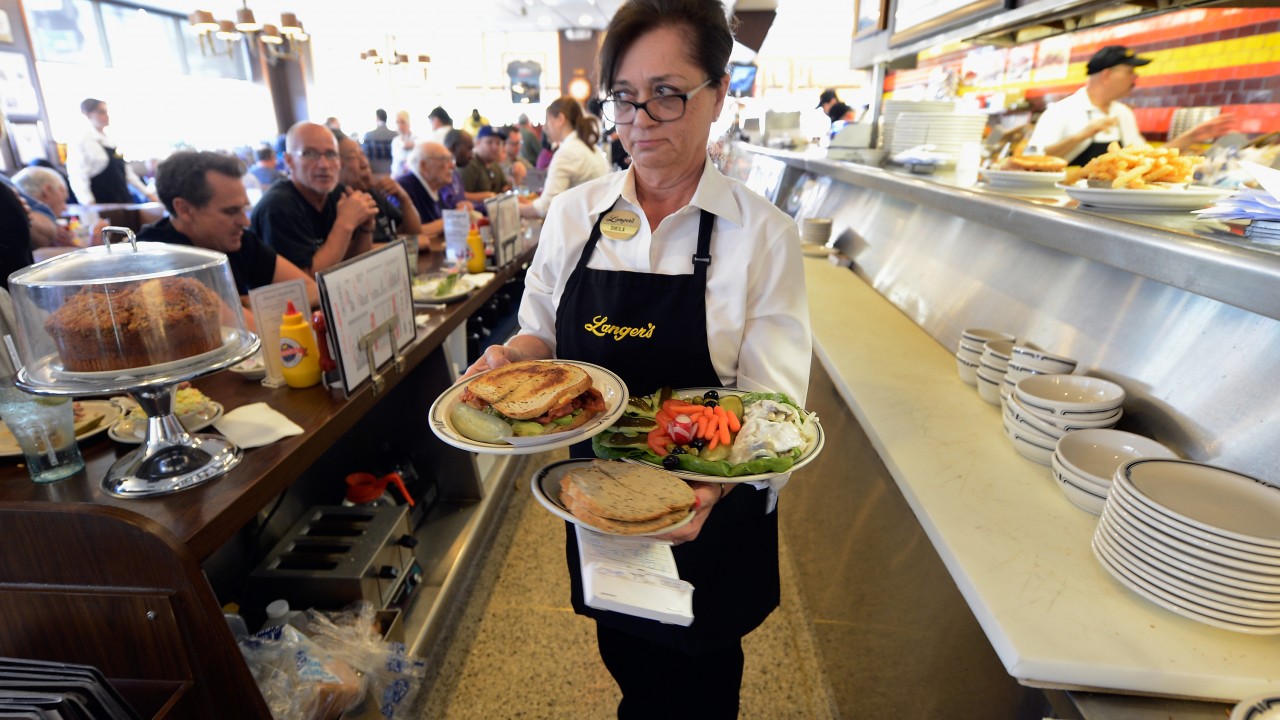
Waitress Sheila Abramson at Langer's Delicatessen serves customers on February 26, 2013 in Los Angeles, California. (Photo by Kevork Djansezian/Getty Images)
This post originally appeared at Talk Poverty.
“Whenever you feel like it’s probably fine to not tip your server, that’s one more bill stacking up because they’re short on money. This is food for the week that our families will go without because you didn’t think it was necessary, even after asking for everything under the sun and receiving it free of charge, mind you. This is one less basic necessity my daughter needs because even TWO more dollars is too much for you.”
These words from a young, Colorado waitress named Taylar Cordova — accompanied by an image of a zero-tip check for a meal totaling $182 — set the internet ablaze this week, receiving thousands of likes, shares and comments on Facebook and sparking impassioned think pieces about the plight of our nation’s 11 million restaurant workers.
And it couldn’t have been timelier. Thanks to the efforts of industry groups like the National Restaurant Association — or “the other NRA,” as I like to call them — which has stymied efforts to raise wages for restaurant workers, April 1 marked the 25th year the federal tipped minimum wage has been frozen at an abysmal $2.13 per hour. And when you’re paid $2.13 per hour by your employer, or even $5.29 as it is in Colorado, you are completely reliant on tips to pay your bills.
Happy anniversary, everybody!
Twenty-five years is a long time to go without paying a significant portion of your workers — servers, bussers, hosts, bartenders — at least the minimum wage, let alone a wage that enables a family to make ends meet. And as a result, servers are twice as likely to need food stamps than the rest of the US workforce, and three times as likely to live in poverty. The restaurant industry now includes 7 of the 10 lowest paying jobs in the country.
And the fact that it’s been 25 years isn’t even the half of it. In fact, it’s only about a quarter of it. Since the creation of the minimum wage almost a century ago, federal law has mandated that tipped workers be paid less than everyone else, a practice rooted in American slavery, when employers didn’t want to pay newly freed slaves a wage. Why? Because of the undue and enduring influence of our friends at the NRA.
The NRA claims to represent small independent businesses, but APRIL FOOLS! It’s actually a front group for multinational corporations like Darden (Olive Garden), DineEquity (Applebee’s/IHOP), and Bloomin’ Brands (Outback Steakhouse). Despite the corporate welfare that these companies manage to secure for themselves, as many as 50 percent of their employees are near the poverty level and must access an array of public assistance programs — at a cost of over $9 million to taxpayers.
And thus, although heart-wrenching and unacceptable, Taylar Cordova’s story is not unique. In my travels and after talking with hundreds of restaurant workers, I’ve met countless women like Taylar — mothers working long hours to put food on the tables of others, all the while uncertain whether they’ll be able to afford food for their own tables later that night.
All of these stories contradict the prevailing myth that tipped workers are largely white men working at fine-dining establishments, earning nearly six figures for their efforts. In reality, nearly 70 percent of tipped restaurant workers are women, 30 percent of whom are mothers, working in casual dining establishments like Denny’s, the Olive Garden, or in Taylar’s case, PF Chang’s. These workers — 42 percent of whom are people of color — also experience disproportionate rates of poverty, financial insecurity and discrimination.
And then there’s the sexual harassment. The restaurant industry is the single largest source of sexual harassment claims in the country. What’s more, workers in states that pay the lowest possible tipped wage of $2.13 per hour experience harassment at twice the rate of their counterparts. Conversely, tipped women workers in states that have eliminated the subminimum wage are less likely to experience sexual harassment. The tipped minimum wage, combined with the practice of tipping, forces women servers to tolerate inappropriate behavior from customers, coworkers and managers in order to survive.
Altogether, this isn’t just about the huge restaurant corporations lining their own pockets. With the lives of over 11 million restaurant workers hanging in the balance, their impact is seismic. Their obstructionist efforts have deep consequences and keep the restaurant industry and our nation at large from moving in a direction that promotes equality across racial, gender and economic lines.
But after years of hard work, and tireless efforts by workers and their allies, stories like Taylar’s are resonating because a national movement for One Fair Wage is gaining incredible momentum. The seven states that have already eliminated the two-tiered minimum wage system (including California and most of the West Coast) account for over one million tipped workers, and their restaurant industries are flourishing. In fact, California is taking a step further; state legislators announced this week they are moving forward with a plan to increase the minimum wage for all workers to $15 per hour. Many other states, including New York, Maine, New Jersey and Pennsylvania, plus Washington DC, are considering wage increases. I urge them not to leave out women and people of color; tipped workers deserve a raise, too.
From Danny Meyer to Amy Schumer, the plight of employees who earn tips is on the tip of everyone’s tongue. It’s time for our legislators to catch up with the rest of America and establish one fair wage for all workers. We hope that on this special 25th anniversary, we’ll finally give the restaurant industry a gift it deserves: a fair wage that ensures dignity and justice for the tens of thousands of hardworking employees who make the restaurant industry what it is.
Watch a clip from Bill Moyers’s interview with activist Saru Jayaraman
Watch Bill’s full interview with Saru Jayaraman »




